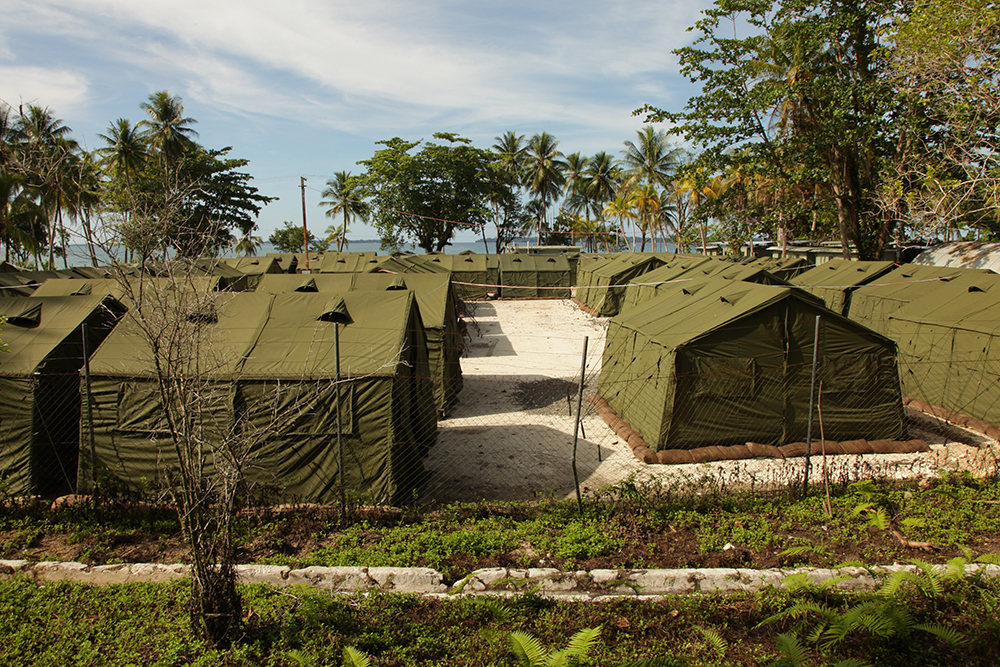Home » Detention centres for regional stability
Detention centres for regional stability

Growing opposition to Australia’s offshore detention program has raised questions about the regional effects of a potential change in Canberra’s migration policy. While the operation of these facilities raises both humanitarian and legal concerns, the loss of the economic and security benefits related to hosting these centres – particularly in Nauru and Papua New Guinea – also needs to be taken into account. Through agreements that allowed offshore processing to take place, both Nauru and PNG have been awarded aid and development packages that have bolstered the social and economic wellbeing of their populations. If the cessation of the offshore detention program reduces or ceases this aid, the economic effects could be disastrous and have a knock-on effect on domestic and regional security.
NAURU

For Nauru, the offshore processing program has revitalised the country’s economy, with Australia pledging $15 million annually – contingent upon the running of the facility. Not only has this averted a potential economic disaster, but there have been clear monetary benefits – the size of the island’s economy increased more than seven-fold between 2000 to 2013.
Offshore detention is crucial to the domestic growth of Nauru, as the jobs based on the running and maintenance of the Nauruan detention facility make up around 60% of overall employment on the island. The loss of this facility and the aid it brings would be extremely destructive to a nation with such a limited and fragile economy. Threatening such an important part of its industry would result in a major economic crisis, undermining the security of the country. If Nauru were to collapse as a result of insolvency, it could drag the region into a relief effort with an economic and human cost much higher than this offshore processing program in the first place.
PAPUA NEW GUINEA

In the case of PNG, the agreement to process irregular maritime arrivals on Manus Island has also resulted in greater development prospects. Again, as it is contingent on the continued operation of the Papuan detention facility, aid from the Australian government has been vital in stabilising the state. Australia’s funding goes, in part, towards reforms of PNG’s education sector, the improvement of healthcare facilities, and the creation of jobs and infrastructure related to the above developments – which in turn also present benefits. This situation is similar to that of Nauru, as PNG is a fragile and poor state with myriad issues concerning its economic wellbeing and development – though PNG finds itself in a comparably better position to its Pacific neighbour, with diversified and growing industries, notably in the field of mining. Even so, the removal of aid to PNG would have a destabilising effect that might mirror that of PNG, bringing with it serious ramifications for the social stability and development of the country. This would result in a regression of the development that Australia has already spent a considerable amount of time, money and diplomatic effort on.
ISSUES
While the argument exists that Australia could still provide the aid packages necessary for these states, the lack of incentive does leave the issue in a more perilous position. International aid is historically an easy target to cut for governments needing measures to rein in spending. This is likely given the current fiscal climate in Australia where a serious budget deficit looms. The only truly safe option to secure this region, therefore, is combining aid with immigration and regional security policies through programs such as the offshore processing. Without a comprehensive review of Australian aid policy, it would seem rather unwise to close the detention and processing facilities in both PNG and Nauru – due to the damage this could cause to the domestic climate and the knock-on effects on regional stability.


The policy of offshore detention is designed to create particular immigration outcomes, not aid outcomes. The side and knock-on effects of a policy are to be considered when evaluating said policy, but to argue that a multi-billion dollar project should be continued because it provides Nauru with $15 million in aid and PNG with the non-specific benefit of ‘greater development prospects’ is illogical, and weights a minor part of the policy far too heavily. If the goal of offshore detention is to create economic development in Nauru and PNG then surely there are more cost-effective ways to accomplish this, and certainly ways that do not also cause considerable human suffering at great cost to Australian taxpayers.